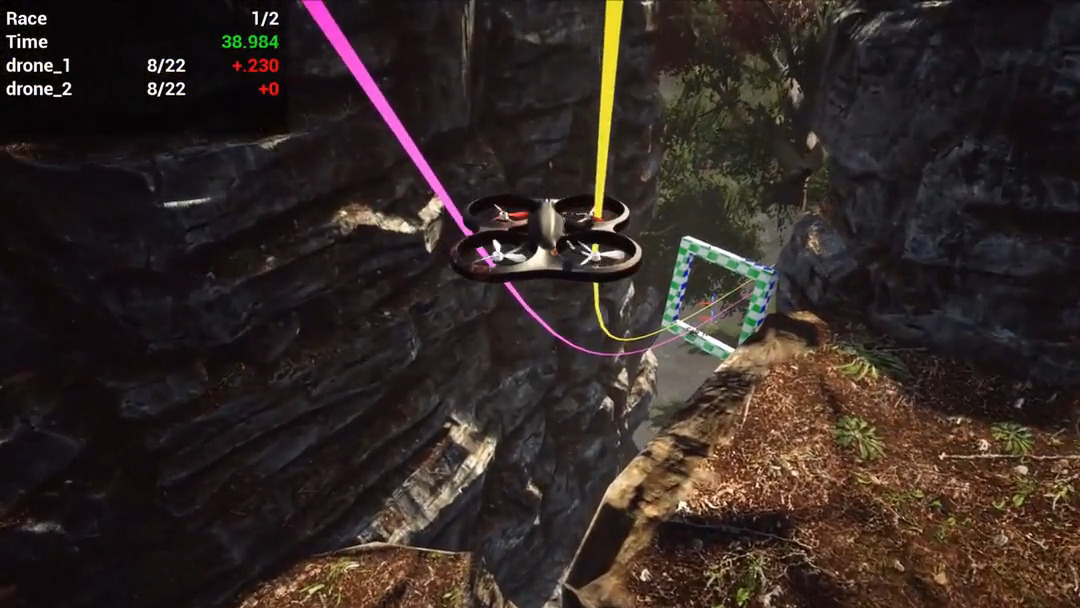
Game Theoretic Planning for Autonomous Drone Racing
We propose an online 3-D planning algorithm for a drone to race competitively against a single adversary drone. The algorithm computes an approximation of the Nash equilibrium in the joint space of trajectories of the two drones at each time step, and proceeds in a receding horizon fashion. The algorithm uses a novel sensitivity term, within an iterative best response computational scheme, to approximate the amount by which the adversary will yield to the ego drone to avoid a collision. This leads to racing trajectories that are more competitive than without the sensitivity term. We prove that the fixed point of this sensitivity enhanced iterative best response satisfies the first-order optimality conditions of a Nash equilibrium. We present results of a simulation study of races with 2-D snd 3-D race courses, showing that our game theoretic planner significantly out-performs a Model Predictive Control (MPC) racing algorithm. We also present results of multiple drone racing experiments on a 3-D track in which drones sense each others’ relative position with on-board vision. The proposed game theoretic planner again out-performs the MPC opponent in these experiments where drones reach speeds up to 1.25m/s.
Related Publications:
- S. Le Cleac’h, M. Schwager, and Z. Manchester, “ALGAMES: A Fast Augmented Lagrangian Solver for Constrained Dynamic Games,” Autonomous Robots, 2021. [pdf] [bibtex]
- S. Le Cleac’h, M. Schwager, and Z. Manchester, “LUCIDGames: Online Unscented Inverse Dynamic Games for Adaptive Trajectory Prediction and Planning,” IEEE Robotics and Automation Letters, vol. 6, no. 3, pp. 5485–5492, 2021. [pdf] [bibtex]
- M. Wang, Z. Wang, J. Talbot, J. C. Gerdes, and M. Schwager, “Game-Theoretic Planning for Self-Driving Cars in Multivehicle Competitive Scenarios,” IEEE Transactions on Robotics, 2021. [pdf] [bibtex]
- Z. Wang, R. Spica, and M. Schwager, “Game Theoretic Motion Planning for Multi-robot Racing,” in Distributed Autonomous Robotic Systems, 2020, vol. 9, pp. 225–238. [pdf] [bibtex]
- G. Notomista, M. Wang, M. Schwager, and M. Egerstedt, “Enhancing Game-Theoretic Autonomous Car Racing Using Control Barrier Functions,” in 2020 IEEE International Conference on Robotics and Automation (ICRA), June 2020, p. 7. [pdf] [bibtex]
- M. Wang, N. Mehr, A. Gaidon, and M. Schwager, “Game-Theoretic Planning for Risk-Aware Interactive Agents,” in 2020 IEEE/RSJ International Conference on Intelligent Robots and Systems (IROS), Oct. 2020, pp. 6998–7005. [pdf] [bibtex]
- S. Le Cleac’h, M. Schwager, and Z. Manchester, “ALGAMES: A Fast Solver for Constrained Dynamic Games,” in Robotics: Science and Systems XVI, July 2020. [pdf] [bibtex]
- R. Madaan, N. Gyde, S. Vemprala, M. Brown, K. Nagami, T. Taubner, E. Cristofalo, D. Scaramuzza, M. Schwager, and A. Kapoor, “AirSim Drone Racing Lab,” in Proceedings of the NeurIPS 2019 Competition and Demonstration Track, Dec. 2020, vol. 123, pp. 177–191. [pdf] [bibtex]
- Z. Wang, T. Taubner, and M. Schwager, “Multi-agent sensitivity enhanced iterative best response: A real-time game theoretic planner for drone racing in 3D environments,” Robotics and Autonomous Systems, vol. 125, p. 103410, Mar. 2020. [pdf] [bibtex]
- M. Wang, Z. Wang, J. Talbot, J. Christian Gerdes, and M. Schwager, “Game Theoretic Planning for Self-Driving Cars in Competitive Scenarios,” in Robotics: Science and Systems XV, June 2019. [pdf] [bibtex]